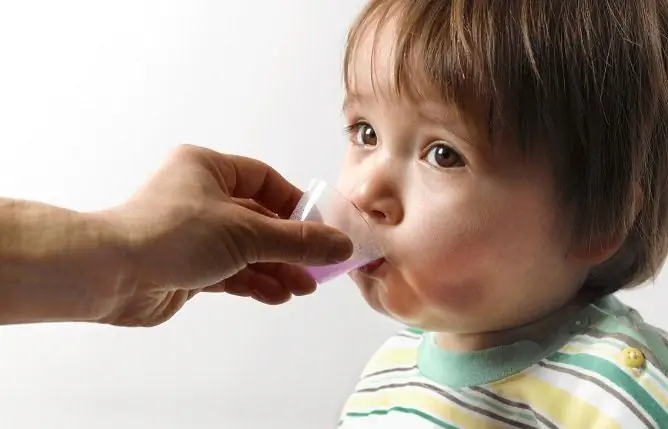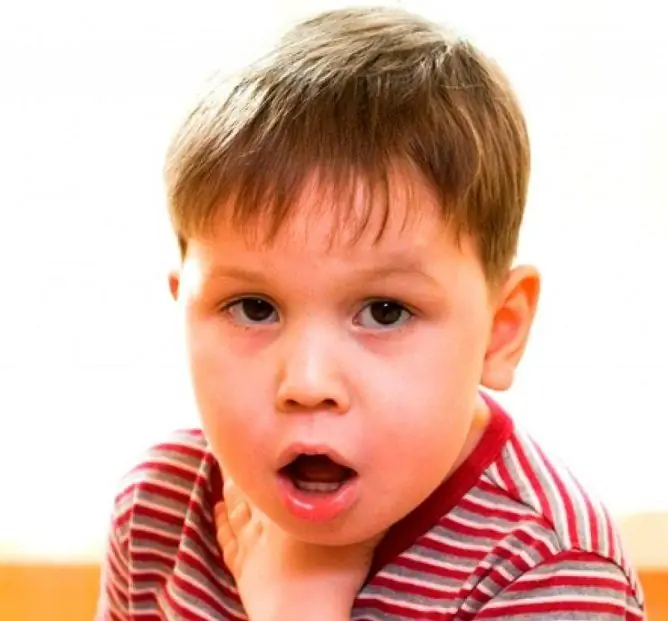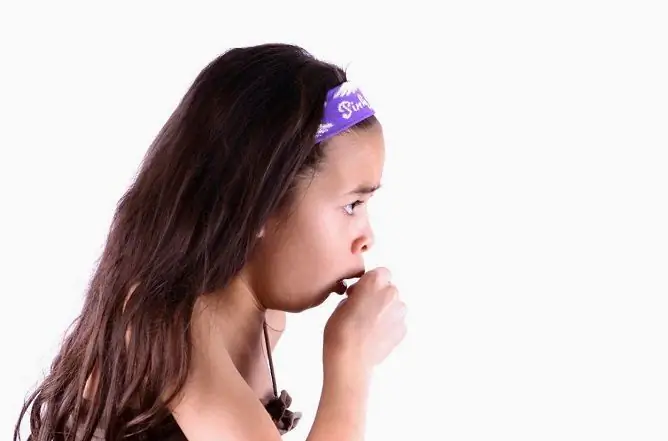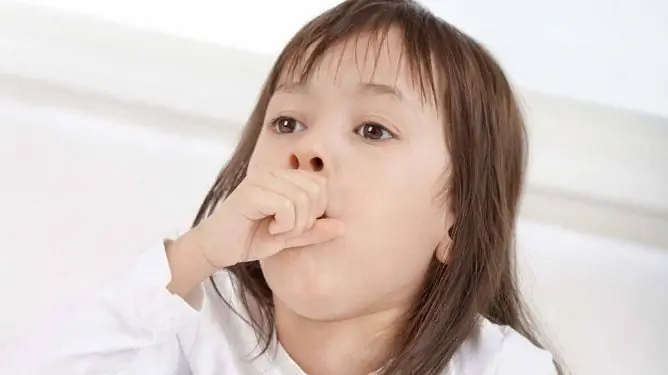- Author Rachel Wainwright wainwright@abchealthonline.com.
- Public 2023-12-15 07:39.
- Last modified 2025-11-02 20:14.
Cough after eating: why it occurs and what to do with the development of cough after eating
The content of the article:
- Why can a cough appear after eating
- Signs and accompanying symptoms of cough after eating
- How to treat a cough that occurs after eating
- How to treat cough with folk remedies
- Video
Cough after eating is a common symptom that can speak not only of gastrointestinal, but also of other pathologies. This phenomenon may indicate the following pathologies:
- diseases of the respiratory system;
- diseases of the gastrointestinal tract;
- increased intra-abdominal pressure;
- narrowing of the esophageal opening of the diaphragm;
- increased acidity of gastric juice;
- dehydration of the body;
- excessive mental stress.
For this reason, with its development, you should consult a doctor.

Regular cough after eating may indicate a serious medical condition
The cough reflex is a protective reaction of the body aimed at clearing the airways from foreign substances and objects. Cough occurs in many diseases of the respiratory tract, as well as pathologies of other organs and systems. Several cough shocks per day are normal and may occur in clinically healthy individuals. But in cases where a person coughs every time after eating, this indicates the presence of a particular pathology. Before starting treatment for a cough that occurs after eating, you should find out the cause.
Why can a cough appear after eating
A cough reflex after eating can also occur in the absence of any pathology, for example, when eating spicy, spicy, too cold or hot foods. Coughing up causes food to enter the airways - this can happen when a person is talking animatedly while eating.
Pathological reasons can be as follows:
- Dysphagia. Impaired swallowing can cause food to enter the respiratory tract, requiring coughing.
- Aspiration pneumonia, which develops when a foreign body enters the respiratory tract. Often the cause of the disease is the ingress of vomit into the respiratory tract.
- Gastroesophageal reflux disease. In this case, post-meal cough occurs when gastric or duodenal contents are thrown into the esophagus and may enter the respiratory tract.
- Gastritis. In this case, the cause is the increased acidity of gastric juice, the throwing of stomach contents into the esophagus.
- Infectious and inflammatory diseases of the respiratory tract. The causative agents in this case can be viruses, bacteria. In the presence of inflammation of the respiratory system (pharyngitis, laryngitis, etc.), cough after eating can occur as a result of irritation of the mucous membranes of the throat (for example, due to the use of hot and cold food) and the resulting reflex spasms of the respiratory tract.
- Allergy. A cough after eating can be caused by direct contact with an allergen (food). It can also develop in patients with bronchial asthma.
- Congestive heart failure. One of the most common causes of cough after or during meals in patients with cardiopathology.
Signs and accompanying symptoms of cough after eating
The cough can begin during, immediately after eating, or some time after eating. With various pathologies, it is accompanied by certain symptoms.
| Disease | Associated symptoms |
| Infectious and inflammatory diseases of the throat area | Pain when swallowing, increased body temperature, a general deterioration in well-being. |
| Bronchial asthma | Attacks of violent cough, after which vitreous sputum is separated. The cough can turn into a choking attack. |
| Allergy | Watery eyes, sneezing, eye redness, skin rashes, itching in the nose and / or throat. With food allergies, the cough usually does not occur after every meal, but in the case of certain foods, most often citrus fruits, as well as dairy products, peanuts. |
| Aspiration pneumonia | The development of complications such as pulmonary heart failure, pulmonary edema is possible. |
| Gastroesophageal reflux disease |
Heartburn, shortness of breath, hoarseness, sour eructation, which is aggravated by tilting the trunk, after eating, at night, dry throat, nausea, vomiting, bloating, chest pain that radiates to the neck, lower jaw, the area between the shoulder blades, to the left part of the chest. The cough occurs 20-30 minutes after eating. |
| Acidic gastritis | Nausea, vomiting, diarrhea or constipation, increased sweating, loss of appetite, dizziness, pain in the heart, increased salivation. Symptoms are often worse at night. |
| Heart (congestive) cough | Dry cough, feeling short of breath, swelling, pain in the projection of the heart, dizziness. |
How to treat a cough that occurs after eating
Patients who often have a cough after eating are advised to drink plenty of fluids (an exception may be a cough in heart failure, consultation with a doctor is necessary). Drinking a sufficient amount of warm liquid helps to moisturize the mucous membranes of the respiratory tract, as well as thinning phlegm and removing it from the respiratory tract.
The house should be cleaned regularly, if necessary, humidify the air in the living quarters. People with chronic diseases need to undergo a preventive medical examination at least once a year.

For better sputum removal, an abundant drinking regimen is necessary.
Treatment for a cough that occurs after eating depends on the cause:
- with dehydration of the body, the patient is shown to drink plenty of fluids, electrolyte preparations can be prescribed. For dry coughs, antitussive drugs may be used. For inflammatory diseases of the respiratory system, mucolytic, expectorant, anti-inflammatory, antipyretic drugs, immunomodulators, vitamin and mineral complexes can be used;
- in infectious processes, depending on the type of pathogen, antiviral, antimycotic drugs, antibiotics, mucolytics, coughs can be used;
- if a foreign body enters the respiratory tract, hospitalization is usually required; surgical operation may be required to remove the object;
- in the case of gastroesophageal reflux disease, patients are shown a sparing diet, drugs can be prescribed that reduce the production of gastric juice, improve motility. Surgery may be required;
- for allergies, antihistamines are prescribed;
- with dysphagia, it is recommended to eat softened food in a warm form, limit or exclude the use of spicy, spicy and other irritating foods.
How to treat cough with folk remedies
In addition to the main treatment for coughs that develop after eating, folk remedies can be used. Medicinal herbs are used in the form of infusions, decoctions, alcohol tinctures.
Here are some popular folk recipes:
- Honey dissolved in warm water (1 teaspoon per glass of water). Also, honey can be dissolved in warm milk, you can add a little butter to the drink.
- A mixture of black radish juice and honey. To prepare it, the ingredients are mixed in a 1: 1 ratio and taken 1 tablespoon (adults) or 1 teaspoon (children) 3-4 times a day.
- A mixture of equal parts lingonberry juice, liquid honey and aloe juice. The remedy is taken 1 teaspoon several times a day with a wet cough.
Video
We offer for viewing a video on the topic of the article.

Anna Aksenova Medical journalist About the author
Education: 2004-2007 "First Kiev Medical College" specialty "Laboratory Diagnostics".
Found a mistake in the text? Select it and press Ctrl + Enter.






